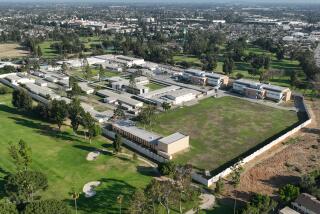Drug-Affected Babies Expected to Double : Health: The Orange County social services office intervened in 1988 for 171 infants with signs of exposure. The figure reached 175 by July, 1989.
- Share via
WASHINGTON — About 300 drug-affected babies will probably be born in Orange County this year, a number nearly double the officially reported figure for 1988, according to figures provided Monday by county drug treatment officials.
The dramatic increase is attributable both to more widespread drug use and to better reporting, especially of crack cocaine, among pregnant women, said Shoni Welsh-Davis, director of the Orange County Perinatal Treatment Program, based in Santa Ana.
Welsh-Davis made the remark in an interview after her testimony before the health and environment subcommittee of the House Committee on Energy and Commerce.
The subcommittee, whose chairman is Rep. Henry A. Waxman (D-Los Angeles), is considering legislation that would authorize $700 million in new federal spending for alcohol and drug abuse treatment by the Alcohol, Drug Abuse and Mental Health Administration. Monday’s hearing focused on the problems of pregnant women.
In the interview, Welsh-Davis said that in 1988 the county Department of Social Services formally intervened in cases involving 171 infants who were born with signs of drug exposure. The figure for 1989 had reached 175 by the end of July, she said, “which means we’re going to double those numbers this year.”
A department spokeswoman said Monday that the 1988 figure had been recently adjusted to 179 after a review of records and that the total for 1989 had reached 222 as of Sept. 30. If the current trend continues, the actual number of county babies born in 1989 who had been exposed to drugs in the womb will probably reach about 300.
Nearly 38,670 babies were born in the county in 1987, the latest year for which figures were immediately available.
The incidence of babies born to drug-addicted mothers “certainly isn’t low” in the county, Welsh-Davis said: “I think we have a huge problem across the nation, in small towns and big towns.”
Operated by the county government, Welsh-Davis’ clinic each year offers outpatient treatment for about 400 drug-addicted mothers or mothers-to-be. About 150 women are enrolled in the 36-week program at any given time, she told the subcommittee. It is the only non-residential drug treatment program in California tailored to meet the needs of pregnant women and the mothers of small children, she testified.
The hearing provided another forum that showcased the continuing disagreement over public health policy between Waxman and Rep. William E. Dannemeyer (R-Fullerton), who also sits on the subcommittee.
In an opening statement, Waxman said: “In some cities, anger has led to a disturbing trend where mothers are sent to jail rather than treatment. Jail is not the answer. . . . Jail is not going to teach an addict how to be a good mother.”
But Dannemeyer suggested that law enforcement agencies should not allow drug-addicted mothers to escape prosecution: “We have a law that says we’re not to use drugs. If we don’t prosecute people . . . we’re a short way removed from the legalization of drugs, aren’t we?”
Welsh-Davis disagreed: “You have to be able to replace their (drug-addicted mothers’) coping mechanism with something more effective. Sending them to jail and sending them back to (the environment) . . . they’re used to all their lives is only reinforcing their behavior.”
On another front, Dannemeyer asked whether religion can play a role in recovery from drug addiction.
“The issue is of interest,” he said, “because some people have observed and written that the reason that people resort to drugs is because they’re seeking . . . to reconnect that breach between their creator, God in heaven . . . and the lives they’re leading.”
However, Welsh-Davis said she does not believe that turning to religion helps in overcoming drug addiction in the long run, although it may have positive short-term effects.
“If I may speak frankly from my own experience,” she said, “I find that to be substituting one addiction for another because what these women need to do is stand on their own, independently, without needing something to rely on.”
Later, however, Welsh-Davis said religious beliefs that support involvement with a formal self-help program, such as Alcoholics Anonymous, can help recovering addicts.
Technically, Congress has already appropriated the $700 million to pay for the new Alcohol, Drug Abuse and Mental Health Administration programs. However, the Waxman panel is still working on a formal authorization bill because some members want to change the way the money will be spent, a source close to the subcommittee said.
The spending bill already approved provides for $415 million in block grants, over which state and local governments would have wide discretion.
Waxman, the source said, wants to reduce the size of the discretionary funds and instead require that states spend a significant amount of the money to programs that would directly benefit drug-addicted women, particularly those who are pregnant.
More to Read
Sign up for Essential California
The most important California stories and recommendations in your inbox every morning.
You may occasionally receive promotional content from the Los Angeles Times.













